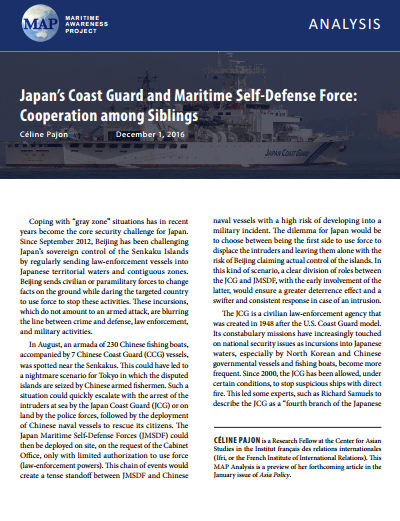Japan’s Coast Guard and Maritime Self-Defense Force: Cooperation among Siblings

Coping with “gray zone” situations has in recent years become the core security challenge for Japan. Since September 2012, Beijing has been challenging Japan’s sovereign control of the Senkaku Islands by regularly sending law-enforcement vessels into Japanese territorial waters and contiguous zones.

Beijing sends civilian or paramilitary forces to change facts on the ground while daring the targeted country to use force to stop these activities. These incursions, which do not amount to an armed attack, are blurring the line between crime and defense, law enforcement, and military activities.
In August, an armada of 230 Chinese fishing boats, accompanied by 7 Chinese Coast Guard (CCG) vessels, was spotted near the Senkakus. This could have led to a nightmare scenario for Tokyo in which the disputed islands are seized by Chinese armed fishermen. Such a situation could quickly escalate with the arrest of the intruders at sea by the Japan Coast Guard (JCG) or on land by the police forces, followed by the deployment of Chinese naval vessels to rescue its citizens. The Japan Maritime Self-Defense Forces (JMSDF) could then be deployed on site, on the request of the Cabinet Office, only with limited authorization to use force (law-enforcement powers). This chain of events would create a tense standoff between JMSDF and Chinese naval vessels with a high risk of developing into a military incident. The dilemma for Japan would be to choose between being the first side to use force to displace the intruders and leaving them alone with the risk of Beijing claiming actual control of the islands. In this kind of scenario, a clear division of roles between the JCG and JMSDF, with the early involvement of the latter, would ensure a greater deterrence effect and a swifter and consistent response in case of an intrusion.
This MAP Analysis is a preview of the author’s forthcoming article in the January issue of Asia Policy.

Available in:
Regions and themes
Share
Download the full analysis
This page contains only a summary of our work. If you would like to have access to all the information from our research on the subject, you can download the full version in PDF format.
Japan’s Coast Guard and Maritime Self-Defense Force: Cooperation among Siblings
Related centers and programs
Discover our other research centers and programsFind out more
Discover all our analyses
China’s Strategy Toward Pacific Island countries: Countering Taiwan and Western Influence
Over the past decade, China has deployed a diplomatic strategy toward the Pacific Island Countries (PICs). This strategy pursues two main objectives: countering Taiwan's diplomatic influence in the region and countering the influence of liberal democracies in what Beijing refers to as the "Global South."

Opening up the G7 to South Korea to Address Contemporary Global Challenges
The G7’s global influence has diminished as powers like China reshape international governance through initiatives such as BRICS and the Shanghai Cooperation Organisation (SCO). With the G7 now representing just 10 per cent of the world’s population and 28 per cent of global GDP, its relevance is increasingly questioned.
Expanding SPDMM as a pivotal institution in the Pacific – A French perspective
The South Pacific Defence Ministers’ Meeting (SPDMM) is the only forum that brings together defense ministers from the wider South Pacific — including Chile, which is hosting it for the first time. This heterogeneous group of countries with varying resources, capacities, and interests — Australia, Chile, Fiji, France, New Zealand, Papua New Guinea (PNG), and Tonga — are united by their shared determination to strengthen cooperation on maritime security and humanitarian assistance and disaster relief (HADR) activities.
EU’s Derisking From China: A Daunting Task
With economic security as a major concern, the EU has recently turned to “derisking” from China. The EU strategy entails reducing critical dependencies and vulnerabilities, including in EU supply chains, and diversifying where necessary, while recognizing the importance and need to maintain open channels of communication.











